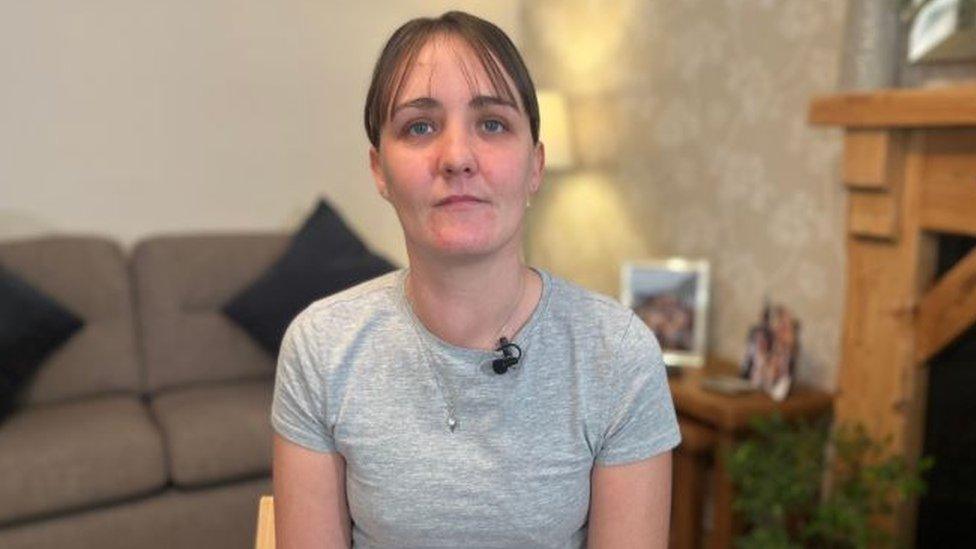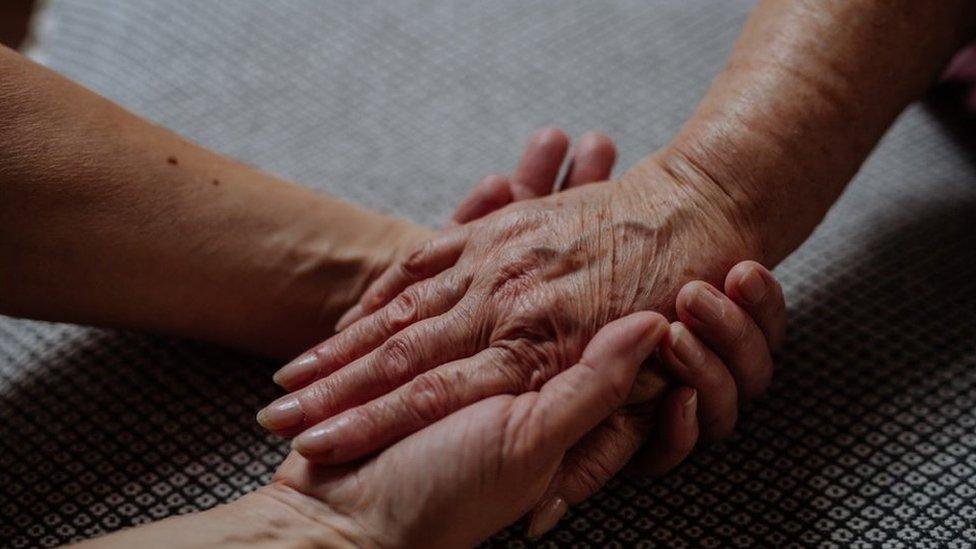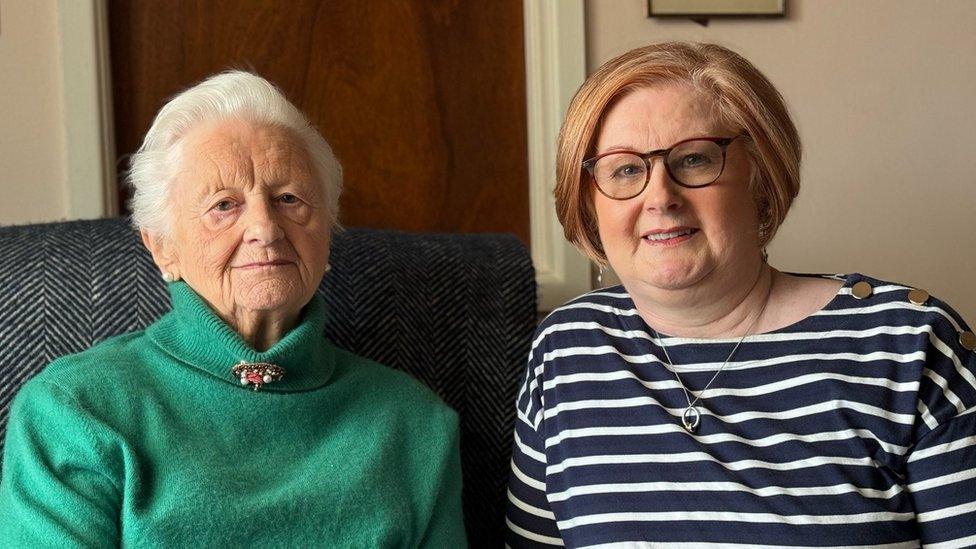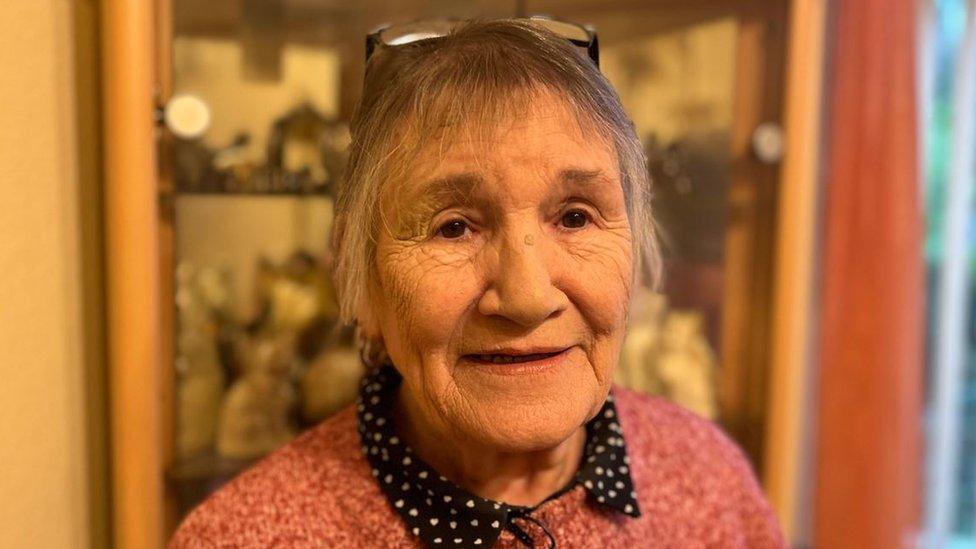Female carers in Northern Ireland forced to quit work - report
- Published

Alison Morgan lives in Lisburn and is currently working full time, after a period out of work
A lack of flexibility and support in the workplace is forcing many female carers out of work, research suggests.
Among them is Alison Morgan who has been in and out of work since she had her son who is autistic and has ADHD.
"Nobody talks about it, it's a whole taboo subject," she told BBC News NI.
Based on a survey of 546 women with unpaid caring roles and focus groups, the study by Carers NI and Women's Regional Consortium found one in three carers had to give up work early.
One in four had to cut their hours.
Ms Morgan lives in Lisburn and is currently working full time, after a period out of work.
"I feel like I'm starting off back at the start again where I left off 10 or 15 years ago," she said.
"The flexible working arrangements that everybody thinks they are going to get when they go into the workplace, it's just not always true or present.
"As much as people would love to believe flexible working arrangements and family-friendly policies and those buzzwords, business needs are dictated to so they aren't as flexible or easy for people with caring responsibilities."
'Our life unravelled'
She said she either had to use up flexi-time or annual leave and try to plan it in advance, to care for her son who is now aged 11.
"But unfortunately there were so many instances in previous jobs I had to phone my manager and say, 'I have to go'.
"My son was suspended for challenging behaviour a couple of years ago and I had to stay at home with him for three days while our life unravelled in front of me and that was a really difficult time, and that's just one example."
The responsibilities of unpaid caring has caused Deborah McAllister, a nurse of 36 years, to leave her job to take care of her mother with dementia and her daughter.
She also previously cared for her stepfather and her father, who died from a stroke.
"I felt like I was caring 24 hours a day," she told BBC Radio's Good Morning Ulster programme.
"There was times when I went to see my dad at three o'clock in the morning and left there at half six to go to work. I'm like: 'This can't continue'.
"It was just really, really tough."

Deborah McAllister says since giving up her job, she has been unable to receive her pension
Ms McAllister said she even tried working part-time, but the challenges became too much she ended up walking out.
"I have definitely given up on returning to work," she added/
"I have done my 36 years and when people ask me, 'How are you?', I say I am absolutely done.
"I have no mental energy, I have no physical energy, I have no emotional energy so I am trying my best to source support for myself."
The Women's Regional Consortium was formed in October 2013 after a survey carried out by two Stormont departments identified a need for greater support for women in disadvantaged areas. It receives funding from the power-sharing government.

Cathy Magowan cares for her mother, Dorothy
According to a co-author of the organisation's latest report - which was researched in conjunction with Carers NI - many women are being robbed of their careers.
Angela Phillips said: "The women that we spoke to, many of them really wanted to be in paid employment and to balance that with their caring responsibilities.
"But they wanted to be supported by government and employers to do that in a way that didn't impact on their own lives, their own finances and their own health and wellbeing.
"Too many women across Northern Ireland are being forced out of the labour market because of a postcode lottery of support for their caring roles.
"This isn't just robbing them of the careers they cherish and the income they rely on to make ends meet, but also denies Northern Ireland's economy a skilled and experienced workforce with a lot to offer."
'You're on call 24/7'
For Cathy Magowan, who cares for her mother, Dorothy, early retirement has been "quite a shock to the system".
She worked in the Western Trust while caring for both her parents, including her late father, and said she felt supported by her manager but decided to retire early at the age of 60.
"I found just prior to Christmas that things were becoming quite difficult and I opted to retire, it was the right thing for me at the right time," she told BBC News NI.
"But it's quite a shock when you go from full-time pay to having just your pension coming in.
"For me, it's about being able to spend that time with mum.
"You're on call 24-7 so it is a lot but it is something that I want to do."
Related topics
- Published13 November 2023

- Published18 January 2023
